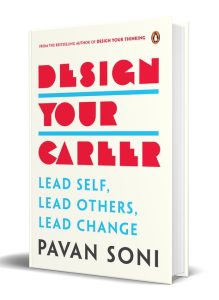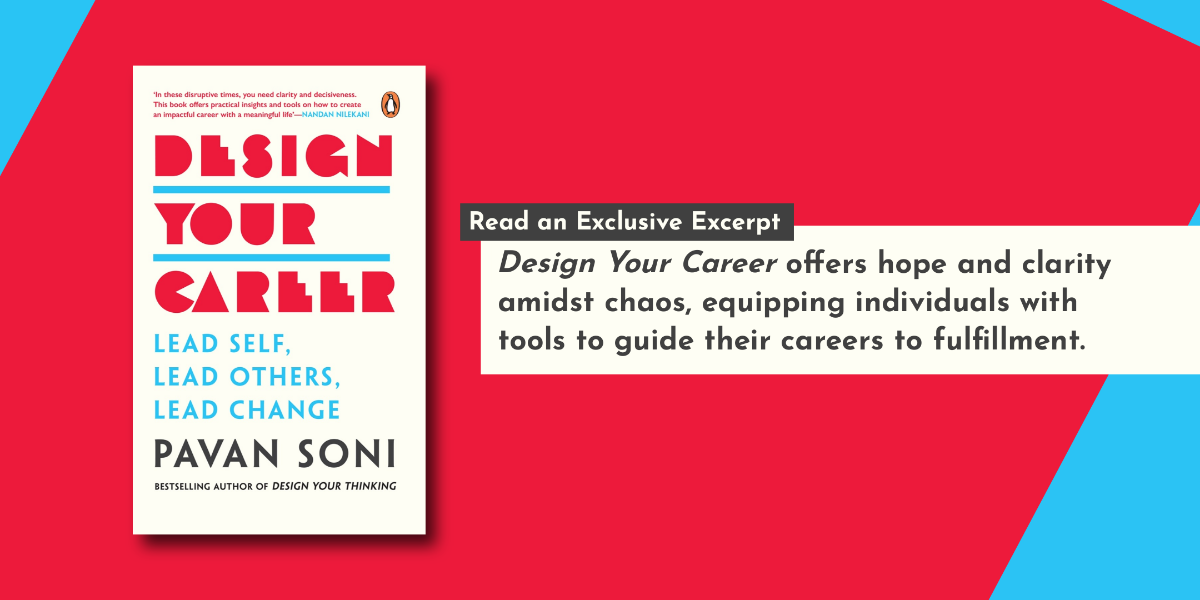In today’s world, choosing a career can be confusing with so many options, but fear not! Pavan Soni’s Design Your Career offers helpful advice from his experience leading over 550 workshops in five countries. Soni aims to help you understand your talents, encourage you to follow your dreams, and find fulfillment in your career.
Read this excerpt to discover how pursuing your passion can be the best decision you ever make.

***
Till about a few years back, talking of ‘following your passion’ in an Indian context would have been futile, for you really didn’t have much of an outlet for what you liked doing. But that’s no longer true. The market has truly opened; people are willing to back you, especially in tier-1 cities, and your mistakes can be overlooked, at least by others. But all this still demands excellence. And excellence, my friend, is in doing the boring stuff well.
Following your passion starts by knowing your passion and as Robin Sharma quips, ‘People who study others are wise but those who study themselves are enlightened.’ So, let’s delve deeper into this seven-letter word.
Here’s my definition: Passion is anything that you do without any external motivation. Put differently, passion is something that you don’t get tired doing. It doesn’t have to be profound or noble. Watching movies, gossiping, cleaning your house, chatting with friends, window shopping—any of that could be a passion. The interesting thing, however, is that ‘passion is blind’. While it can drive you, it can also quickly exhaust you.
Passion without reason can certainly waste you. A teacher is passionate and so is a murderer, but for entirely different causes. Said Khalil Gibran, ‘Your reason and your passion are the rudder and the sails of your seafaring soul.’ While your passion propels you, your reason directs you. Passion comes from heart, reason from mind. We need both, especially a true, internally inspired passion. ‘Passion that is not the result of some commitment or attachment, passion that is not lust,’ suggested Krishnamurti.
Your passion can be infectious—for your team, organization and even customers. Identifying himself as someone who is excited by ideas and grounded by empathy, Satya Nadella is passionate about putting empathy at the centre of everything he pursues.16 As he took on the leadership at the struggling Microsoft in February 2014, the company was deeply fragmented, characterized by a ‘know-it-all’ culture. But over the years, Nadella turned around the once-pioneer into a technological magnate and into a ‘learn-it-all’ culture.
Nadella deems a company as a vehicle to channelize individual passion for the larger good, and in the case of Microsoft, it’s about building products that empower others. So, you see, passion is not just a private affair; it can rally troops, provided you display it viscerally.
Kalanithi was passionate about writing, for he always contemplated between excelling in neurosurgery-neuroscience or becoming a full-time writer. But the diagnosis of cancer at age thirty-six changed his calculus, and what he produced in his last few months is arguably one of the finest pieces on spirituality. His memoir, When Breath Becomes Air, left Bill Gates in tears. It’s almost of the same gravitas as Viktor Frankl’s Man’s Search for Meaning.
But let’s see what passion looks like towards the end of your otherwise very promising career. On Kalanithi’s writing regime, Lucy, his estranged wife, remembers:
Paul wrote relentlessly, fueled by purpose, motivated by a ticking clock. He started with midnight bursts when he was still a neurosurgery chief resident, softly tapping away on his laptop as he lay next to me in bed; later he spent afternoons in his recliner, drafted paragraphs in his oncologist’s waiting room, took phone calls from his editor while chemotherapy dripped into his veins, carried his silver laptop everywhere he went. When his fingertips developed painful fissures because of his chemotherapy, we found seamless, silver-lined gloves that allowed use of a trackpad and keyboard. Strategies for retaining the mental focus needed to write, despite the punishing fatigue of progressive cancer, were the focus of his palliative-care appointments. He was determined to keep writing.
Only passion can take you through the most difficult phases of your life. Passion gives you a sense of joy, a drive to pursue something bigger than yourself. And this joy is very much personal. Others may wonder at your enthusiasm as unwarranted, but don’t bother; you don’t owe anything to most others. While I play my guitar at street corners for it delights me, most passers-by don’t bother with a first look. Perhaps that’s how I developed a thick skin.
Here’s a real testimony of passion. Twelve North American writers have won the Nobel Prize in Literature between 1901 and 2015, and yet none of them had an MFA (Master of Fine Arts). Four of them never even got past high school. Neither Quentin Tarantino nor Christopher Nolan, two of the finest directors of our generation, ever went to a movie school. Maybe that’s why. ‘I’m a self-taught filmmaker. I never went to film school. I never studied filmmaking,’ admits Nolan. ‘I started making films when I was seven years old. Making films using my dad’s super 8 camera and action figures doing stop-motion films. A little bit of animation and a certain amount of live-action and I just carried on making films as I grew up and, over the years, they got bigger, hopefully better.’
Acknowledge that passion drives the purpose, and not the other way around. If you are driven, then you will find the means, including expertise, if necessary.
***
Get your copy of Design Your Career by Pavan Soni on Amazon or wherever books are sold.









